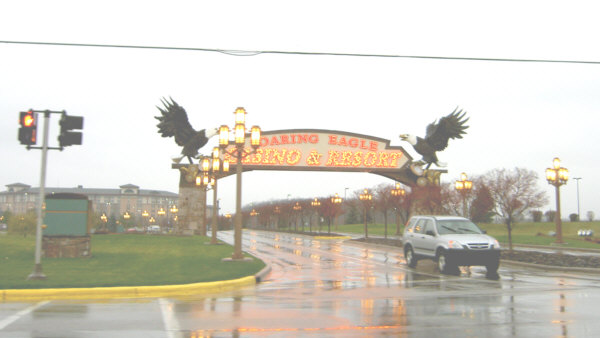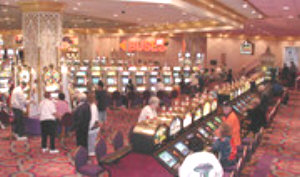Urban Gambles Fail: Casinos Fall Short of Glimmering Economic Promise
|
||||||||||
| Printer Friendly Story View |

Entrance to Soaring Eagle Casino at Mt. Pleasant is only about 40 miles from Bay City.

Slot machines offer glittering, but mainly futile, promise of instant riches. "The casino almost always wins," says one gambler.
Detroit's bet on casinos as an economic "magic bullet" is still unrealized, say informed observers.
Port Huron, Grand Rapids, Benton Harbor-St. Joseph, and other urban areas of the state have casinos in their sights hoping to find the answer to declining jobs and economic growth.
Bay City would have to fall in line behind these areas which are years ahead in planning and lobbying for a casino, say observers.
"It is really a cruel distraction from realistic planning for economic growth," says one Lansing lobbyist with casino know how. "Especially for a town like Bay City that is light years behind the curve. Such a proposal is sure to ignite a devastating long-lasting public controversy that takes the focus off viable projects."
Red flags of compulsive gambling and crime also are raised when casinos expand into urban areas, studies in San Francisco, Buffalo, New York, and Pittsburgh, Pennsylvania show.
California reporters put their investigative microscopes on Detroit to give insight on what could be expected from a gambling initiative. Their scrutiny showed mixed results.
Crime fell in Detroit by 4 percent from 1999 to 2000, with robberies, burglaries and thefts all decreasing, the San Francisco Chronicle found. The rest of the nation showed a slight increase in crime during the same period.
However, the membership of Gamblers Anonymous in Detroit doubled in the same period.
A study by the United Way of Wayne County found that 61 percent of residents in the metropolitan area had gambled in the casinos in the past year and that 5.7 percent of Detroiters are problem gamblers, compared to 3.7 percent of suburbanites.
Experts say compulsive gambling is a greater problem where casinos have a local market than in destination resorts like Las Vegas, whose visitors take their problems home with them.
Experts question the economic benefits of casinos that attract mostly local players.
"You have to bring in visitors," Timothy Ryan, dean of the College of Business at the University of New Orleans told the Chronicle. "If I live in New Orleans and spend $100 in the casino, I might have spent it at a movie theater or restaurant. It's not a new impact."
Detroit's casinos are attracting people to downtown -- about 34,000 a day and more on weekends, and the influx has made downtown safer as well as more appealing, said observers.
But downtown business operators say they have seen no new customers and their regulars are spending less. That result mirrors a 2003 study by the Anderson Economic Group on the potential impact of a casino on Grand Rapids.
"They're spending all their money at the casinos and charging their $4 lunches," Colette Kadrich, bartender at the Old Shillelagh bar and grill in Greektown told the newspaper.
One compulsive gamblers, Marquita Crockett of Detroit, concluded the casinos have meant nothing but trouble.
"I wish they never came," said Crockett in a newspaper interview. "You can't win at the casinos."
Another urban area contemplating casinos as economic development is Pittsburgh, Pennsylvania.
Robert Goodman, author of "The Luck Business: The Devastating Consequences and Broken Promises of America's Gambling Explosion," recently spoke at University of Pittsburgh's School of Social Work about the large social service costs linked to casino development.
He estimates the cost of legalized gambling to Pennsylvania at $800 million annually. A 1 percent increase in compulsive gambling would carry a social cost per person of $10,000, said the author.
Critics say casinos in low income areas affect local residents disproportionately. The Research Institute on Addictions at the University of Buffalo conducted a phone study with 2631 people from 1990 - 2000 to see the connections between gambling problems, drinking problems, socioeconomic status and proximity to casinos.
The study found that people who live within 10 miles of a casino are twice as likely to be problem gamblers. They also found that "lower income people are much more likely to be problem gamblers than those who are more affluent."
Shea Howell, a community activist in Detroit, and former co-chair of Detroiters United, a coalition that unsuccessfully fought the construction of casinos in Michigan, has seen the effect a new casino had on the residents in the surrounding area.
"When people are desperate, and a lot of Detroit is pretty desperate, people are willing to risk their last dollar in the hopes of making 10 or 20. That level of desperation is really what these casinos feed on. It is a desperation that fosters delusion and creates a kind of hopelessness and unreality about the crisis that is really destructive to city life." states Howell.
She also said that Detroit, as a city recovering from the collapse of the auto industry, was desperate for economic development, yet all the casino brought was empty promises.
According to Howell "The casinos have not generated business around them. Instead they tend to draw people inside their walls and then nothing spills out over it. So the casino in Greektown has just about destroyed all of the family businesses and restaurants. Now there are just a few largely commercial businesses and the casino itself."
Detroit receives about a million dollars annually and Howell questions why "given the fact that [casinos] make millions upon millions every day it does seem that the give back is not very much." ###
| Printer Friendly Story View |
|
|

Dave Rogers |
|
|
|
Printer-Friendly Story View
0200 Nd: 04-15-2024 d 4 cpr 0
12/31/2020 P3v3-0200-Ad.cfm
SPONSORED LINKS
12/31/2020 drop ads P3v3-0200-Ad.cfm


